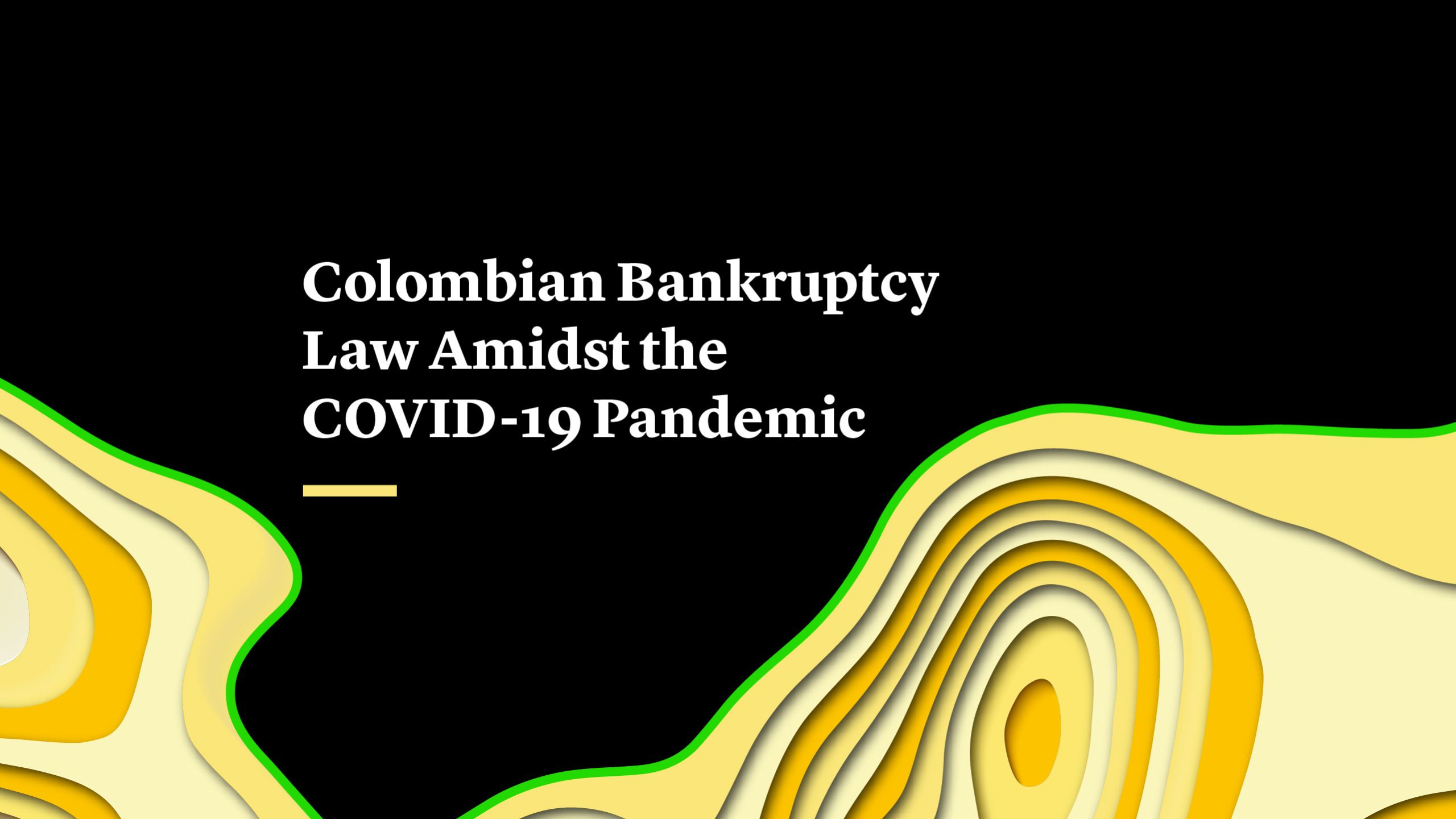
2020 was a disruptive year for business everywhere, and global policymakers have scrambled to tackle COVID-19’s devastating financial impact. In Colombia, the Government amended Law 1116 with four decrees to create tailormade, emergency bankruptcy proceedings, and rescue measures.

Provisional Amendments to Law 1116
Of all Colombia’s bankruptcy regimes, Law 1116 is the most consequential and widely used, regulating reorganization and judicial liquidation proceedings for:
- Commercial and mixed companies
- Merchants
- Business-conducting trusts
- Branches of foreign companies
One of the emergency regulations’ primary objectives was to expedite access to bankruptcy relief for companies affected by COVID-19.
Decree 560 changed Law 1116 in the following ways:
- Admission to bankruptcy proceedings is simplified for companies affected by COVID-19
- Bankruptcy Courts must prioritize review of filings by companies impacted by COVID
- Bankruptcy Courts only check necessary documents are submitted, without auditing them
- Imminent payment defaults are suspended for 24 months, to ward off a bankruptcy spike
- Decrees 560 & 842 allow debtors in reorganization proceedings to pay small obligations and sell non-essential assets, without Bankruptcy Court approval
These amendments are initially in force for two years.
Provisional Amendments to Law 1116
Of all Colombia’s bankruptcy regimes, Law 1116 is the most consequential and widely used, regulating reorganization and judicial liquidation proceedings for:
- Commercial and mixed companies
- Merchants
- Business-conducting trusts
- Branches of foreign companies
One of the emergency regulations’ primary objectives was to expedite access to bankruptcy relief for companies affected by COVID-19.
Decree 560 changed Law 1116 in the following ways:
- Admission to bankruptcy proceedings is simplified for companies affected by COVID-19
- Bankruptcy Courts must prioritize review of filings by companies impacted by COVID
- Bankruptcy Courts only check necessary documents are submitted, without auditing them
- Imminent payment defaults are suspended for 24 months, to ward off a bankruptcy spike
- Decrees 560 & 842 allow debtors in reorganization proceedings to pay small obligations and sell non-essential assets, without Bankruptcy Court approval
These amendments are initially in force for two years.

Newly Created Bankruptcy Proceedings
Colombia’s traditional bankruptcy proceedings have lasted approximately 20 months. To speed things up, Decree 560 introduced two new expedited proceedings:
- The emergency negotiation of a reorganization agreement proceeding
- The business recovery proceeding before a chamber of commerce
The Emergency Negotiation of a Reorganization Agreement
This abridged version of Law 1116’s traditional reorganization proceeding allows debtors to negotiate directly with creditors for three months to achieve a reorganization agreement. There is only one hearing before the Bankruptcy Court, where the Court hears objections and rules on whether to confirm the reorganization agreement.
The Business Recovery Proceeding
This also allows debtors three months to negotiate with creditors, but before the Chamber of Commerce, and with the help of a mediator. There is also a small fee, determined by the debt’s value. Unlike the emergency negotiation, this is only binding on creditors who agree to it. Any objections and observations can be solved through ADR methods, recognised in Colombian Law.
Newly Created Bankruptcy Proceedings
Colombia’s traditional bankruptcy proceedings have lasted approximately 20 months. To speed things up, Decree 560 introduced two new expedited proceedings:
- The emergency negotiation of a reorganization agreement proceeding
- The business recovery proceeding before a chamber of commerce
The Emergency Negotiation of a Reorganization Agreement
This abridged version of Law 1116’s traditional reorganization proceeding allows debtors to negotiate directly with creditors for three months to achieve a reorganization agreement. There is only one hearing before the Bankruptcy Court, where the Court hears objections and rules on whether to confirm the reorganization agreement.
The Business Recovery Proceeding
This also allows debtors three months to negotiate with creditors, but before the Chamber of Commerce, and with the help of a mediator. There is also a small fee, determined by the debt’s value. Unlike the emergency negotiation, this is only binding on creditors who agree to it. Any objections and observations can be solved through ADR methods, recognised in Colombian Law.
Decree 772 also introduced simplified liquidation proceedings for small businesses: the abbreviated reorganization proceeding for small companies, and the simplified liquidation proceeding for small companies.
They are both truncated proceedings, available to debtors with assets worth less than 5,000 legal minimum monthly wages (approximately USD $1.2mn).

Rescue Measures
These new emergency measures create creditor incentives and aim to facilitate business recovery in three core ways:
Creditors can capitalize their credits through debtor shares or senior bonds;
The debtor company can discharge the part of its debt that exceeds its valuation as an economic unit
Sustainable debt agreements allow restructuring through a bond issuance, which all acquiescing creditors take a share in (this falls outside the reorganization agreement).
Decree 560 also adds incentives for creditors to provide liquidity to the debtor’s business, creates bailout mechanisms to prevent liquidation and makes it easier to obtain financing following a bankruptcy petition.
COVID-19 has posed specific challenges to emerging market jurisdictions, which often lack efficient bankruptcy proceedings. The impact of Colombia’s innovative emergency regulations, however, can already be seen; reorganization proceedings, which once took around 20 months, can now be completed in five months or less. While there is still only a small case sample to judge from, the signs, so far, are positive, and some measures may yet become a permanent part of Colombian law.


Carlos Umaña Trujillo
Partner, Brigard Urrutia
Managing partner of Brigard Urrutia since 2012 and partner since 1990, with more than 30 years of experience. He splits his time between several practice areas and is particularly commended for his knowledge in infrastructure, public procurement, utility law and natural resources law.
Per Chambers and Partners, Mr. Umaña is highly renowned for his expertise as a “skilled negotiator” and “praised for his experience and sharp technical knowledge”.
Mr. Umaña graduated from the Colegio Mayor de Nuestra Señora del Rosario and holds a Master’s degree in Comparative Jurisprudence from New York University School of Law, which he obtained in 1985.
Recognized in Corporate/M&A, Public Law and Projects by Chambers & Partners Latin America- 2016 and in Corporate M&A in Chambers and Partners Global 2017.
Recognized as a Leading Lawyer in Corporate M&A and Projects in Legal 500-2016.
